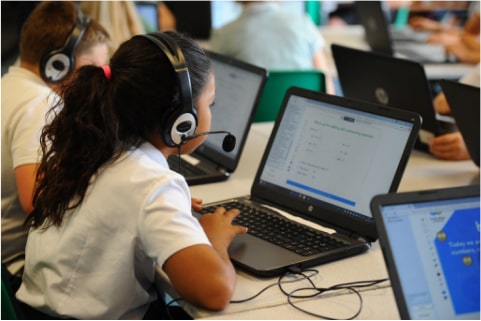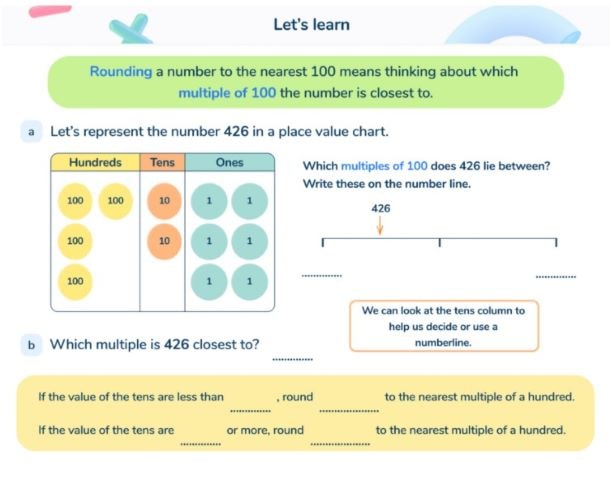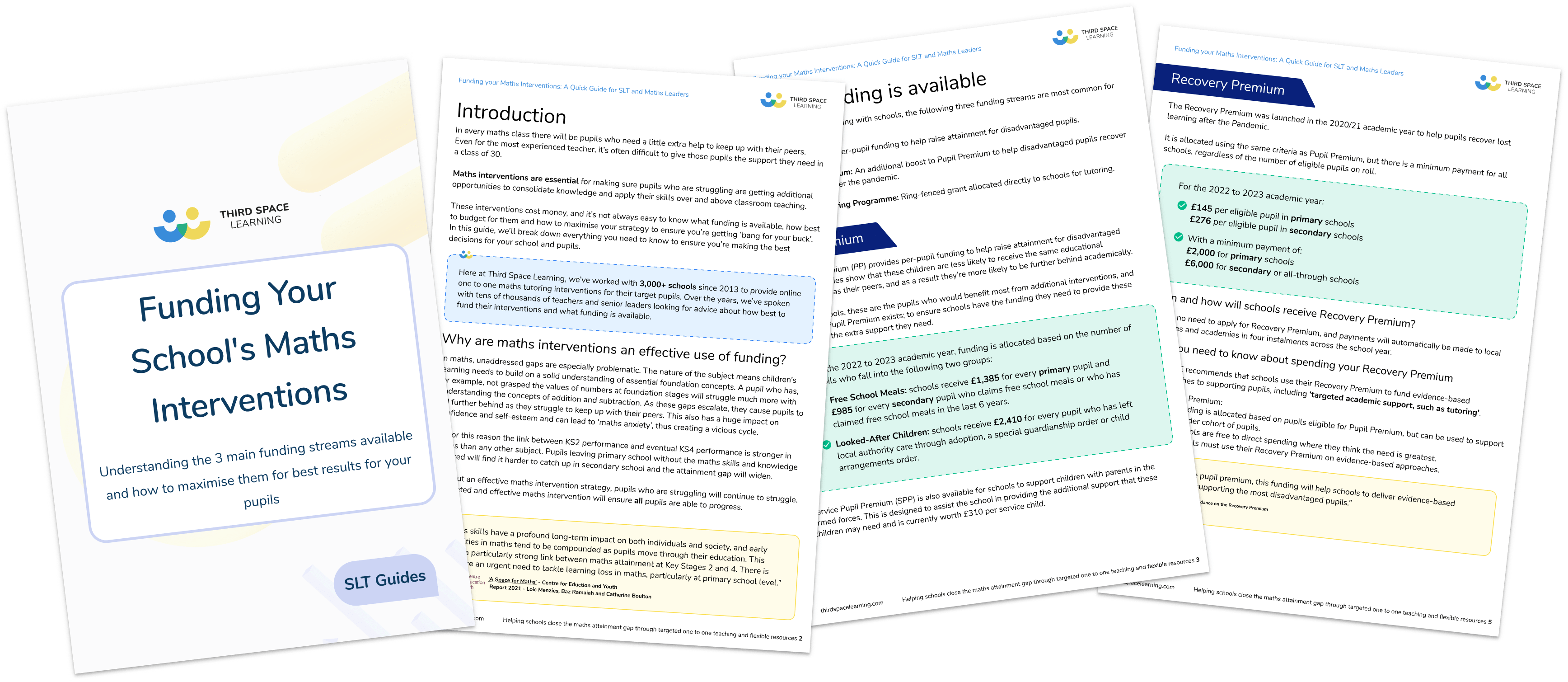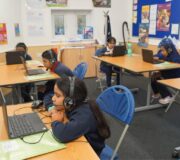Explained: Your School’s Tuition Funding Options
This article was originally published in 2022 and references the National Tutoring Programme (NTP). As of September 2024, schools will no longer receive NTP funding. Learn more about funding tutoring beyond September 2024.
Back in 2020, as part of their catch up funding and Education Recovery Plan, the Department for Education introduced a number of different initiatives to help schools implement and fund in-school interventions, especially tuition. Since then, these initiatives have been through several iterations. This article outlines the different funding streams available for tutoring in 2023/24.
It’s no secret that school closures and the disrupted learning of recent years have had a significant impact on pupils’ attainment.
Overall, pupils have made less progress than in previous years, and the attainment gap between disadvantaged pupils and their peers has widened. Many studies show an increased learning loss in maths when compared to other subjects.
As a result, schools now have additional funding available to help these pupils catch up, and tutoring plays a key part in how the DfE expects schools to spend this funding.
Why the emphasis on tuition?
Research from the EEF also suggests that tutoring is one of the most effective ways to raise attainment. Evidence indicates that the best way to make sure this tutoring is effective, targeted and aligned with classroom learning is to ensure the tuition is led by the school.
Senior Leader's Guide To Pupil Premium
Robust research on the interventions that will have the biggest impact in supporting you to narrow the attainment gap for pupils in receipt of pupil premium.
Download Free Now!This tutoring for schools might be in small groups or on a one to one basis, depending on the needs of the schools and pupils. One to one tutoring, in particular, delivers approximately five additional months’ progress on average.
Traditionally, however, tutoring has been seen as expensive for schools, and limited school budgets have meant it’s not always something that schools have been able to prioritise.
This is where Third Space Learning’s model of affordable tuition focused on individual pupils’ gaps has proved extremely cost-effective for thousands of schools and over 150,000 UK pupils over the past 10 years. If you’re new to how this works, take a look at the KS2 maths interventions and secondary school interventions on offer .
What are your options for catch up and tuition funding in your school?
Amid all the announcements and the changing policies, it can be difficult to understand what the options are and what they’ll actually mean to you.
Here we break down the different routes schools have to receive subsidised tuition and other targeted Covid-19 catch up support to help school leaders best allocate their budget, staffing and interventions over the next academic year.

1. The National Tutoring Programme
The National Tutoring Programme is a government funded, sector-led initiative designed to support schools to address the impact of coronavirus on pupils’ progress and attainment.
It provides schools with additional per-pupil funding to spend specifically on tutoring across three key ‘routes’:
- DfE-approved Tuition Partners, such as Third Space Learning
- School-led tutoring: internal school staff including retired, returning or supply teachers and support staff
- Academic Mentors
This article contains a summary of the three NTP routes and other funding available for tuition. You can find more information about the National Tutoring Programme here.
What this means for your budget in 2023/24
According to the latest information from the National Tutoring Programme, each pupil eligible for Pupil Premium will receive a minimum of £67.50 in ring-fenced funding to spend on tutoring this academic year. Schools are given the flexibility and choice to use this funding to support any student.
What you should know about the National Tutoring Programme
- In 2023/24, it is used to cover up to 50% of the cost incurred to school for tuition, up to a maximum hourly per-pupil rate of £18 (rising to £47 in special schools)
- Schools have the flexibility to manage their own allocation. They can pay above or below the assumed cost of £18 per hour, but NTP funding can only be used to cover costs within the guidelines above.
- Schools will be required to report on total cost of tutoring, total hours of tutoring delivered, and total pupils supported at the end of the academic year.
- Any NTP funding unspent or spent incorrectly (e.g. not on tutoring or not within the guidelines) will be clawed back at the end end of the academic year.
There is no need to apply for this funding and schools will automatically receive their funding in three stages across the year.
DfE-approved tuition partners
Through the Tuition Partner route of the programme, schools can use their National Tutoring Programme on an approved list of Tuition Partners. These Partners have all been through a rigorous Department for Education application process assessing their efficacy and impact as well as their tutor recruitment and training processes and safeguarding policies.
Third Space Learning is an approved DfE Tuition Partner and, since the launch of the National Tutoring Programme in 2020, we’re proud to have provided subsidised online one to one maths tutoring to tens of thousands of pupils across the UK.
What you should know about the NTP tuition partners
- Tuition Partners cover a range of different subject areas, although it is expected that most tutoring will be in English and maths.
- Partners also cover face to face and online tutoring, as well as small-group and one to one.
- External tutoring organisations must apply to be an approved Tuition Partner in order to be eligible for any National Tutoring Programme funding
- Prices vary by partner and individual partners can charge above or below the assumed £18 per hour average.
- Because all Third Space Learning tuition is delivered online via our global tutor community, we’re able to provide one to one tutoring for the price many providers charge for small group sessions.
Find out how to get subsidised online maths tuition from Third Space Learning and How to choose your tuition partner
School-led tutoring
Through the school-led tutoring route of the National Tutoring Programme, schools can use their tuition funding to cover tutoring delivered by ‘members of a school’s own personnel, either currently employed or specifically engaged for this purpose.’
This includes:
- Teaching Assistants
- Retired teachers
- Returning teachers
- Supply teachers
- Support staff
- Classroom teachers
What you should know about school-led tutoring
- Schools must ensure NTP funding is used only for tutoring, and the provision of tutoring must be in addition to any staff member’s core roles and responsibilities.
- A specific tutor training programme has been developed to ensure school-led tutoring is of the highest-quality.
- The training is free and available online
- Training is optional for any tutor with Qualified Teacher Status.
Academic mentors
Academic mentors are ‘salaried, in-house members of staff who work alongside teachers to provide one-to-one and small group subject-specific tuition’.
What you should know about academic mentors
- Schools should apply to Cognition Education, one of the three NTP providers, to be assigned an Academic Mentor.
- The minimum salary is £19,000 per year, rising to £21,000 depending on qualitifications and experience. Schools are free to set higher salaries if they wish.
- Small schools are able to ‘share’ an Academic Mentor with other schools in their trust or local authority.
2. Recovery Premium
The Recovery Premium was introduced in 2021/22. This fund is in addition to Pupil Premium and can be used as schools see fit to support their disadvantaged pupils.
“Building on the pupil premium, this funding will help schools to deliver evidence-based approaches for supporting the most disadvantaged pupils.”
Government guidance on the Recovery Premium, June 2021
The Recovery Premium will work alongside Pupil Premium funding, and all schools eligible for the Pupil Premium will be eligible for the Recovery Premium. Funding is allocated on a per-pupil basis, using the same criteria as the Pupil Premium.
What this means for your budget in 2023/24
- £145 per eligible pupil in primary schools
- £276 per eligible pupil in secondary schools
With a minimum payment of:
- £2,000 for primary schools
- £6,000 for secondary or all-through schools
What you should know about the Recovery Premium
- Guidance published in September 2021 stated that schools should use the Recovery Premium to fund evidence-based approaches to supporting pupils, including ‘targeted academic support, such as tutoring’.
- The recovery premium will automatically be paid to schools in 4 payments
- Unlike Pupil Premium, The Recovery Premium cannot be used to cover the remaining costs of tuition that are not covered by the National Tutoring Programme.
Read more: Effective one to one maths lessons: what works best for disadvantaged pupils
3. Pupil Premium
As well as the funds that make up the government’s Covid recovery plan, schools will also receive their Pupil Premium funding as usual.
The Pupil Premium Grant is designed to help schools support their disadvantaged pupils, as the evidence shows that these pupils face challenges that their peers do not, and will not perform as well in school.
What this means for your budget in 2023/24
Pupil Premium has increased by 5% this academic year.
Free School Meals: £1,455 for every primary pupil and £1,035 for every secondary pupil.
Looked-After Children: £2,530
What you should know about Pupil Premium
- The main aim of this funding is to raise attainment, although schools are also free to use Pupil Premium funding on ‘non-academic’ outcomes and improvements, such as improving pupils’ mental health and boosting attendance. Schools can use their Pupil Premium on activities that also benefit non-eligible pupils.
- Schools are required to demonstrate ‘how their spending decisions are informed by research evidence’ and publish a Pupil Premium strategy using the government’s strategy statement templates.
- Ofsted is also likely to interrogate your use of Pupil Premium funding.
- Since we started supporting schools with online one to one tuition in 2013 – prior to the creation of the specific Covid recovery funds and schemes – the majority of the schools using Third Space Learning used a portion of their Pupil Premium to fund the programme.
- Pupil Premium can be used to cover the remaining costs of tutoring from Tuition Partners not covered by the National Tutoring Programme.
“Third Space was an attractive proposition because it was one to one and all the tutors were maths specialists. It was also a great way to use our Pupil Premium allowance. “
Catherine Prole, Deputy Headteacher, St Michael’s Primary School, Trafford
Read more: How St Michael’s Primary School used Pupil Premium to raise attainment in their disadvantaged pupils.
4. 16-19 tuition funding
As the name suggests, the 16-19 tuition fund is available to 16 to 19 institutions to enable them to offer tuition to the students in most need and mitigate the impact of the Covid-19 pandemic on students’ learning.
Students must be on a 16 to 19 study programme or T Level, and the funding is expected to be used to provide tutoring over and above the educational activity set out by that programme.
The following groups of students are eligible:
- Students who have not achieved a grade 6 in GCSE English and/or GCSE maths at age 16
- Students from the 27% most economically deprived areas of the country (based on the index of multiple deprivation)
- Students who are economically disadvantaged who meet the 16 to 19 Bursary Fund eligibility criteria and would need catch-up support to reach their full potential will be eligible, even where their prior attainment is high
- Students aged 19 to 24 who have an education, health, and care (EHC) plan
Students who have not achieved a grade 4 in GCSE maths and/or English should be prioritised in the first instance.
Institutions are free to use the funding on whatever tuition they see as best for their students, including internally resourced tuition and external tutoring providers such as Third Space Learning.
Tutoring can be delivered in academic subjects like English or maths, in non-academic subjects such as exam preparation, or in vocational courses.
Eligible SEND students and those with EHC plans aged 19 to 24 can receive pastoral support including mental health and wellbeing as part of the fund.
Institutions are responsible for
- The quality of provision
- Student health and wellbeing
- Managing the funding, allocated in line with the funding conditions and controls and accountability requirements
- Record keeping
- Providing ESFA and DfE with management information as required
Many institutions choose DfE-accredited tutoring providers such as Third Space Learning, as these providers have been subject to an approval process to assure the quality of provision.
You can learn more about how Third Space Learning supports 16-19 students here.
What this means for your budget in 2023/24
The higher, lower and FTE instances are calculated using 2023 to 2024 funding band proportions also shown in the 16 to 19 funding statement.
Institutions will receive £100 per instance for students in bands 4 and above and £60 for students in the lower bands.
What you should know about the 16-19 Tuition Fund
The tutoring must be delivered in small groups or one to one. Small groups should be up to a maximum of 5 students, rising to 7 in exceptional circumstances, including when groups need to be merged at short notice due to tutor/staff absences.
You should be mindful of the quality of provision when considering group size. Evidence indicates that the smaller the group, the more effective the provision, with groups of 3 or less the most effective.
16 to 19 Tuition Fund 2023 to 2024 guidance
Research from the Education Endowment Foundation shows that one to one tutoring is the best ratio for academic outcomes.
As well as keeping groups as small as possible, the DfE also recommends:
- Ensuring tutoring is focused on students’ specific needs
- Linking tutoring content to classroom learning
- Using subject specialist tutors
Institutions have to opt-in for funding, but institutions who meet the following criteria will be automatically opted in for the 2023/24 academic year:
- you submitted a complete end of year report for 2020 to 2021 and 2021 to 2022 and
- received 16 to 19 tuition funding in academic year 2022 to 2023
Institutions can opt in and opt out via a form accessed via their DfE Sign-in account.
These were the two windows for submitting your opt-in or opt-out form:
- Window 1 opens 8am, Tuesday 9 May 2023 and will close at 11:59pm on Friday 26 May 2023
- Window 2 opens 8am, Monday 2 October 2023 and will close at 11:59pm on Friday 20 October 2023
You will then receive 16 to 19 tuition funding through your 16 to 19 funding allocation. You will receive payment as follows:
- For the May 2023 window, payments will commence from the start of the 2023 to 2024 academic year
- For the October 2023 window, payments will commence no earlier than December 2023
Up to 10% of your funding can be spent to cover ‘direct costs’ in addition to actual tutor costs. This is limited to:
- Room hire
- Attendance management
- Materials necessary for delivering tuition
- Costs incurred due to short notice cancellation of a tutoring session due to circumstances outside the institution’s control
- Preparation time
You are required to record where students have received support funded through the 16 to 19 tuition fund and provide further details in the following places:
- The individualised learner record (ILR)
- The school census
- An in year spend (IYS) report
- An end-of-year financial report
About Third Space Learning
Here at Third Space Learning, we’ve been helping schools to close the maths attainment gap through one to one tuition since 2013.
Since then, we’ve helped over 3,800 schools improve educational outcomes for more than 150,000 pupils. Up until the 2019/20 academic year, the majority of our schools used Third Space Learning as a way to ensure their Pupil Premium funding was going towards something that would have a real and lasting impact on their most disadvantaged pupils.
“The resources are high quality and up to date with recent research. The one to one tuition is a great addition to our support for Pupil Premium pupils.”
Abi Hann, Deputy Headteacher, Holy Trinity Primary School, London
During the 2020/21 academic year, we were really proud to be selected as one of the first approved Tuition Partners of the National Tutoring Programme. In its first year, over 14,000 pupils across 1,000+ schools received subsidised support from Third Space Learning.
Pupils begin their time with us with a diagnostic assessment, and lessons are chosen specifically to plug their individual gaps, and tutors are trained to adapt the pitch and pace of each lesson according to their needs.

“After this year’s lockdown, we wanted an intervention that could support all of our Year 5 and 6 pupils at once. The diagnostic assessment is really great. Although it personalises the lessons to each pupil, it still allows us to have input, and we really enjoyed having that flexibility. It’s also really great how the actual teaching is personalised to the pupil’s specific interests – it creates an instant connection between pupil and tutor, and the slots are consistent so it’s the same tutor each session.”
Lindsay Lind, St Paul’s Catholic Junior School, Deputy Headteacher, Liverpool.
Read more about how one to one tuition helped the pupils at St Paul’s to catch up in maths after school closures.
We’d love to have a chat with your school about how we can help, or to help you make sense of the different funding options available to your school. You can schedule a call directly here and we’ll be in touch on the day and time that suits you best.
Further reading
- National Tutoring Programme: guidance from the Department of Education
- Recovery Premium funding: guidance from the Department of Education
- Pupil Premium: An overview from the Department of Education
- EEF Covid-19 resources for teachers
- National Tutoring Programme Tuition Partners: Year 1 (2020−21) resources
DO YOU HAVE STUDENTS WHO NEED MORE SUPPORT IN MATHS?
Every week Third Space Learning’s maths specialist tutors support thousands of students across hundreds of schools with weekly online maths tuition designed to plug gaps and boost progress.
Since 2013 these personalised one to one lessons have helped over 150,000 primary and secondary students become more confident, able mathematicians.
Learn about the national tutoring programme or request a personalised quote for your school to speak to us about your school’s needs and how we can help.





